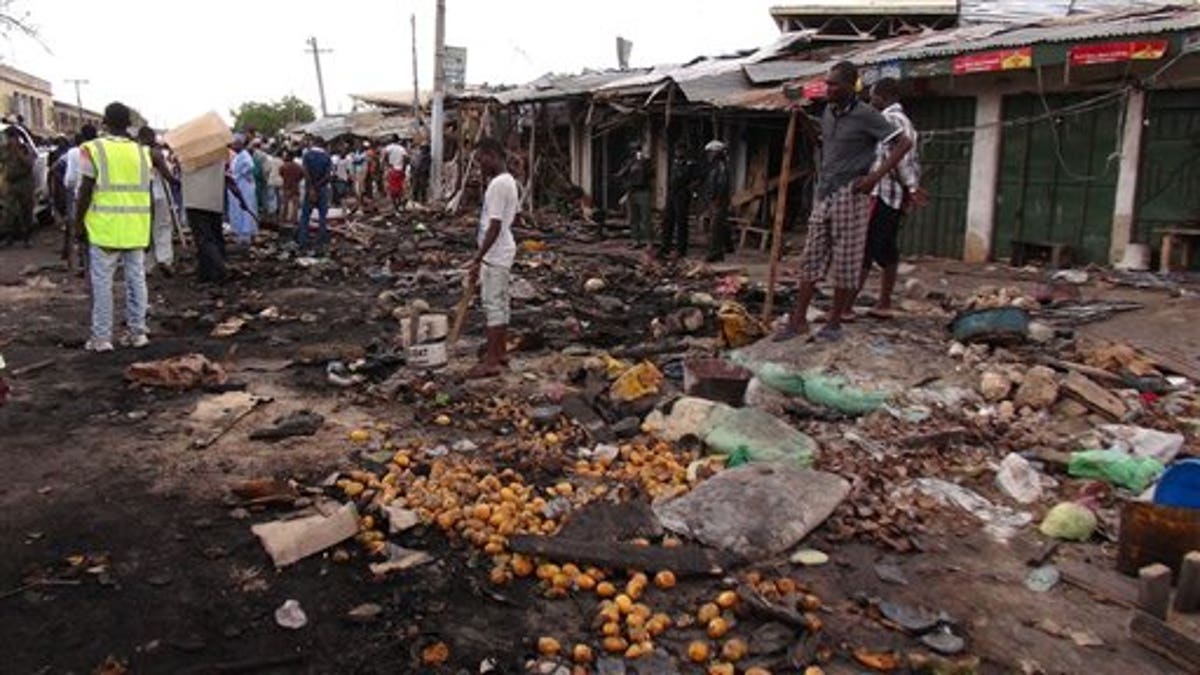
People gather on July 2, 2014, at the scene of a car bomb explosion, at the central market, in Maiduguri, Nigeria, the birthplace of terror group Boko Haram. (AP Photo/Jossy Ola)
It is the law of the market: When you withdraw from the playing field, your competitors will seize the opportunity to expand and fill the void.
Sometimes withdrawal of a big player leads to temporary chaos, as competitors grapple for power. Eventually, a winner will emerge. These rules apply not only to business, but also in international relations, where there has been a surge in advances of violent government regimes and other internal players over the past couple of years.
Among traditional players, like Russian President Vladimir Putin, we have seen growing ambition to rebuild a lost empire by means of swallowing pieces of former Soviet nations, such as Ukraine, through armed paramilitaries, which pursue an aggressive campaign in the East of the country.
But we also have seen new players emerge, such as the jihadist terror group ISIS, conquering vast swaths of territory, including a substantial amount of oil and gas fields in crumbling Syria and Iraq, which have been destabilized by severe sectarian and political violence and instability in recent years. Indeed, ISIS went as far as declaring a Caliphate, the “Islamic State,” in the heart of the Middle East, thereby claiming legitimacy as a state, which represents the interests of all Muslims and demands their absolute loyalty and submission.
The Kurds, spurred into action by the growing threat of ISIS and the disintegration of Iraq and Syria, have been pushing much harder for statehood, signaled by the first independent export of oil to Turkey through the recently opened Kirkuk-Ceyhan pipeline.
Iran’s policy of meddling in the affairs of neighboring countries has now expanded rigorously – equally boosted by Obama’s withdrawal from Iraq, his passiveness in light of the Syrian genocide and crowned by an interim deal in the nuclear conflict that granted Tehran’s rogue regime massive sanctions relief. Iran will only continue to act more aggressively in the region and beyond, because it believes it’s gained a free pass for its rogue behavior.
All of these major conflicts in Ukraine, Syria and Iraq have something in common: the territorial integrity of nation states with ethnic and religious diversity is falling apart. Borders of countries are breaking down and if we don’t halt this epic disaster, a gigantic refugee crisis is on the horizon.
Already 6.5 million Syrians have been internally displaced, and 2.5 million people have fled Syria – mainly to Turkey, Lebanon, Jordan and Iraq. But these countries’ capacities are already strained, and more refugees are expected as the violence in Syria and Iraq continues. More innocent people will lose their homeland and the Western world will sooner rather than later be haunted by its lack of leadership and moral clarity.
[pullquote]
Among those operating from the outside, we have seen the Somali Islamist group Al-Shabaab expand its operations and attack several targets in neighboring Kenya, such as the attack on a police station in Gama in early July or the more prominent armed ambush on the Westgate mall in the capital Nairobi last year.
Boko Haram also has expanded its brutal terror regime in the region and has not only kidnapped 200 Nigerian girls, but also the wife of Cameroon’s vice president while killing three others.
In the Arab world we have seen chaos and bitter infighting between various rebel factions that strive for power and control over resources. In Libya, the situation has become so bad that various states, such as the U.S., Germany and the Netherlands, have evacuated their embassies and the UK advised all its citizens to leave for fear that the country is imploding. Some will rightly point to the fact that the West’s intervention in Libya has created this mess, but chaos is what inevitably follows when you leave a job unfinished.
The accumulation of instability, disintegration and emergence of new destructive players on the world stage is not mere coincidence, but a direct result of the withdrawal of the greatest power, the United States.
U.S. disengagement under Obama has created a power vacuum and emboldened the boldest actors to carve out pieces of the world for themselves and redraw maps, as there is no powerful deterrent anymore. While the last decade of Western engagement in Iraq, Afghanistan and Libya has been messy, it has still been controllable, because we had some influence on developments.
Now, after having withdrawn from the world under President Obama’s “leadership,” we have no control, no influence and can only watch the mayhem unfold. The only option we’re left with is to pack our things and run away (as seen by current evacuations in Libya).
If this continues, we will soon be left with a world that is hardly recognizable; a world full of traditional and new powers with expansionist ambitions and hostile intentions toward the West; a world where our resources to protect our population against these threats could soon be overstrained due to their mere abundance. If we want to reverse this trend, the West -- and especially the U.S. -- needs to engage and lead again.
Our enemies are only as strong as we are weak. It is high time to end this weakness – for good.
Edisa Korugic is a political and security risk analyst and associate member of the International Institute for Strategic Studies. Saba Farzan is a German- Iranian journalist and director of political studies at the Institute for Middle Eastern Democracy.








































